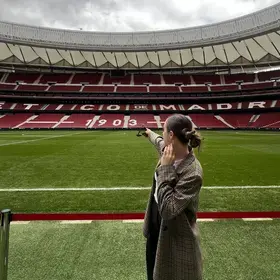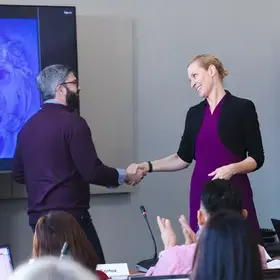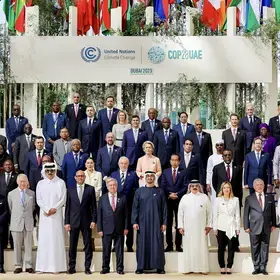Last July, four students participated in the Negotiation and Conflict Resolution course International Fieldwork in Conflict Resolution and Peacebuilding, which took place in Kampala, Uganda. The students, Eva Paul, Fabian Schmid-Grosse, BriAnne Watkins, Ratha Khuon, hailed from the School of Professional Studies and Teachers College at Columbia University. They wanted to understand the role of conflict negotiation in addressing real-world problems in places touched by war and ongoing conflict.
Led by instructor Dr. Jose Pascal da Rocha, the students observed and participated in conflict resolution work with the Center for Conflict Resolution (CECORE). These Columbia students assisted CECORE with critical projects in the following areas: conflict analysis; environmental conflict resolution; and gender and peacebuilding in Uganda. They also conducted their own individual research projects and had opportunities to take field trips in order to learn more about the local culture and inform their work.
Da Rocha said, "The International Fieldwork Course is a vital component of the M.S. program in Negotiation and Conflict Resolution. It provides students with the unique opportunity to apply research skills to real-world problems, thereby strengthening their ability to add value to the field of conflict resolution. These are competencies that prospective employers will be asking for upon graduation. We also encourage students from other departments and schools at Columbia to apply to the course." Here, Fabian Schmid-Grosse, M.S. candidate in Social-Organizational Psychology at Teachers College, shares his story.
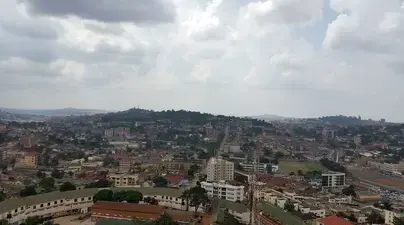
Above: Kampala, Uganda
Fabian Schmid-Grosse:
"We were all thrilled to take part in this fieldwork course because we found out we would participate and work hands-on with a local NGO called CECORE, the Center for Conflict Resolution. We worked with communities in the north of Uganda who have been through war and conflict. From the first day onward, it felt like we could contribute immediately with the theories we had learned at Columbia."
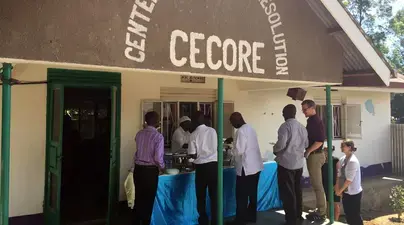
Above: The office of CECORE (the Center for Conflict Resolution) in Kampala
"The course not only theoretical, but we were also able to go into the field and apply our knowledge. We also ventured outside of Kampala, the capital; we also went to the north of Uganda to a town called Gulu. We visited other NGOs and had the chance to learn about their work in the field and share ideas. For my individual research project, I worked with a group of refugees who came to Uganda from South Sudan. I developed a new model that considered the needs of this new group of South Sudanese refugees as well as their neighbors, underprivileged communities in the north of Uganda. It was important to strike a balance, to meet both of these groups’ needs and mitigate conflicts. I recently finished my master's program in organizational psychology at Teachers College."
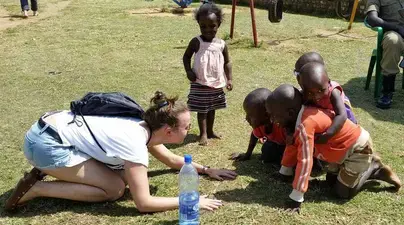
Above: In a town near the equator, student Eva Paul plays with local children.
"Besides our academic program, we also took two leisure trips, and this was part of a trip to the equator that goes through Uganda. It was near a village, so some local children were there as well. This is Eva Paul, one of the students in our group, who spent some of her leisure time with the local children."
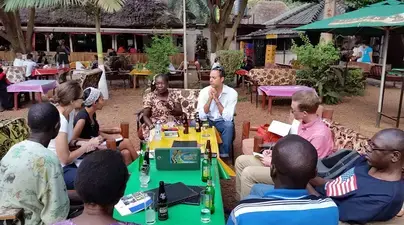
Above: Lina Zedriga speaks about peace building."
Through CECORE, we were able to meet some peace building professionals in Uganda who have been active in the communities for a long, long time. Here, we met a professional, Lina Zedriga, who is sitting next to our professor. She shared some of her stories, how she deals with discrimination of underprivileged groups. It was a very inspirational session with her. She conveyed the passion that guides her work."
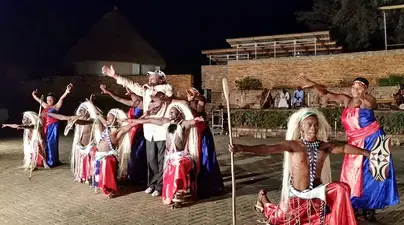
Above: Ugandans present folk dances."
One weekend, we attended a cultural dance festival where dozens of Ugandan tribes shared their traditional dances and songs. It was a great event to get to know more about the heritage and the culture of this country. In the end, we were all invited to dance with them."
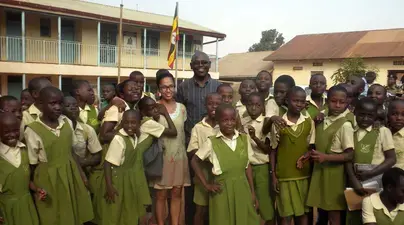
Above: Local children take a break from class.
"This was a trip that we took with a local police officer who speaks with students about violence in their homes – violence from their parents or other kids and how they can cope with it and address it. The kids were amazing. They were so fascinated with the work the police officer did. It was also a special day for them to host guests at the school, so they all came out for a picture."
Learn more about the graduate program in Negotiation and Conflict Resolution.
